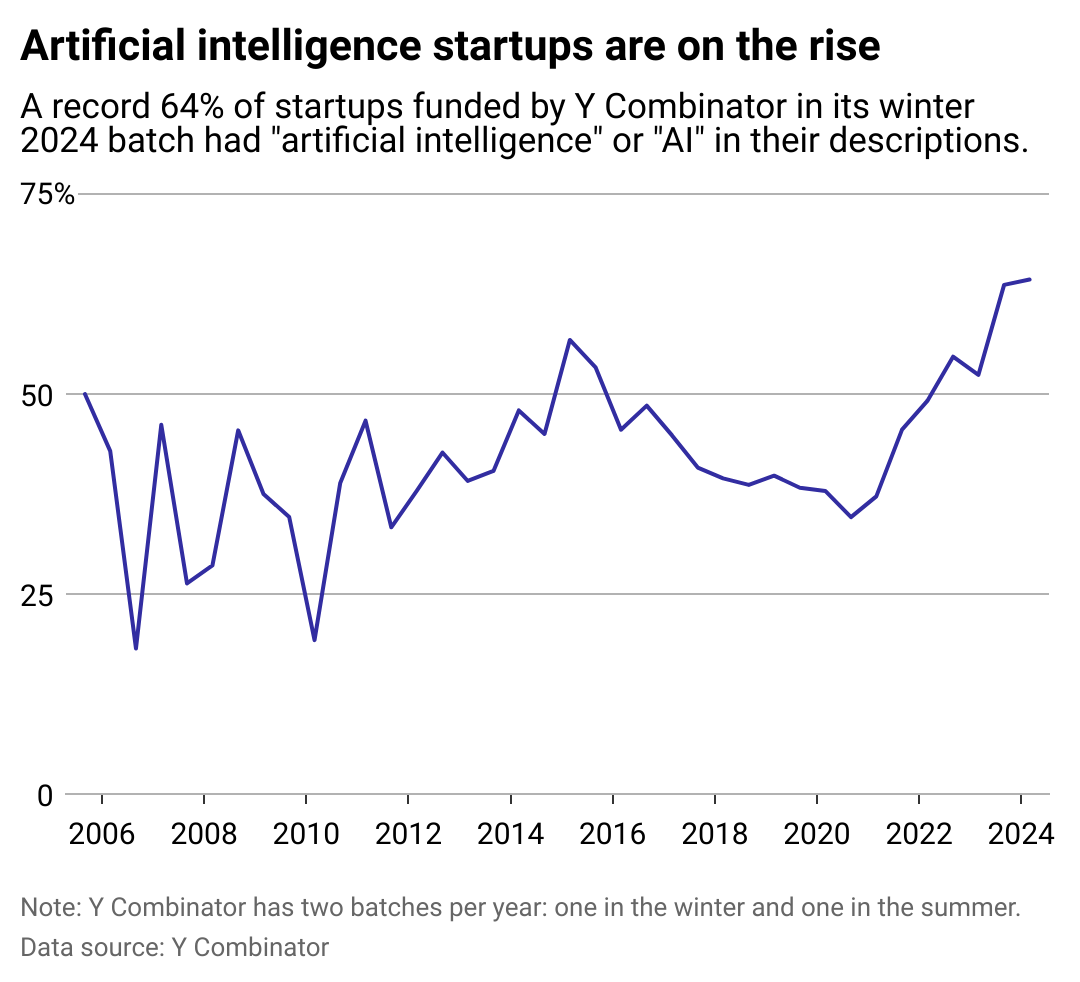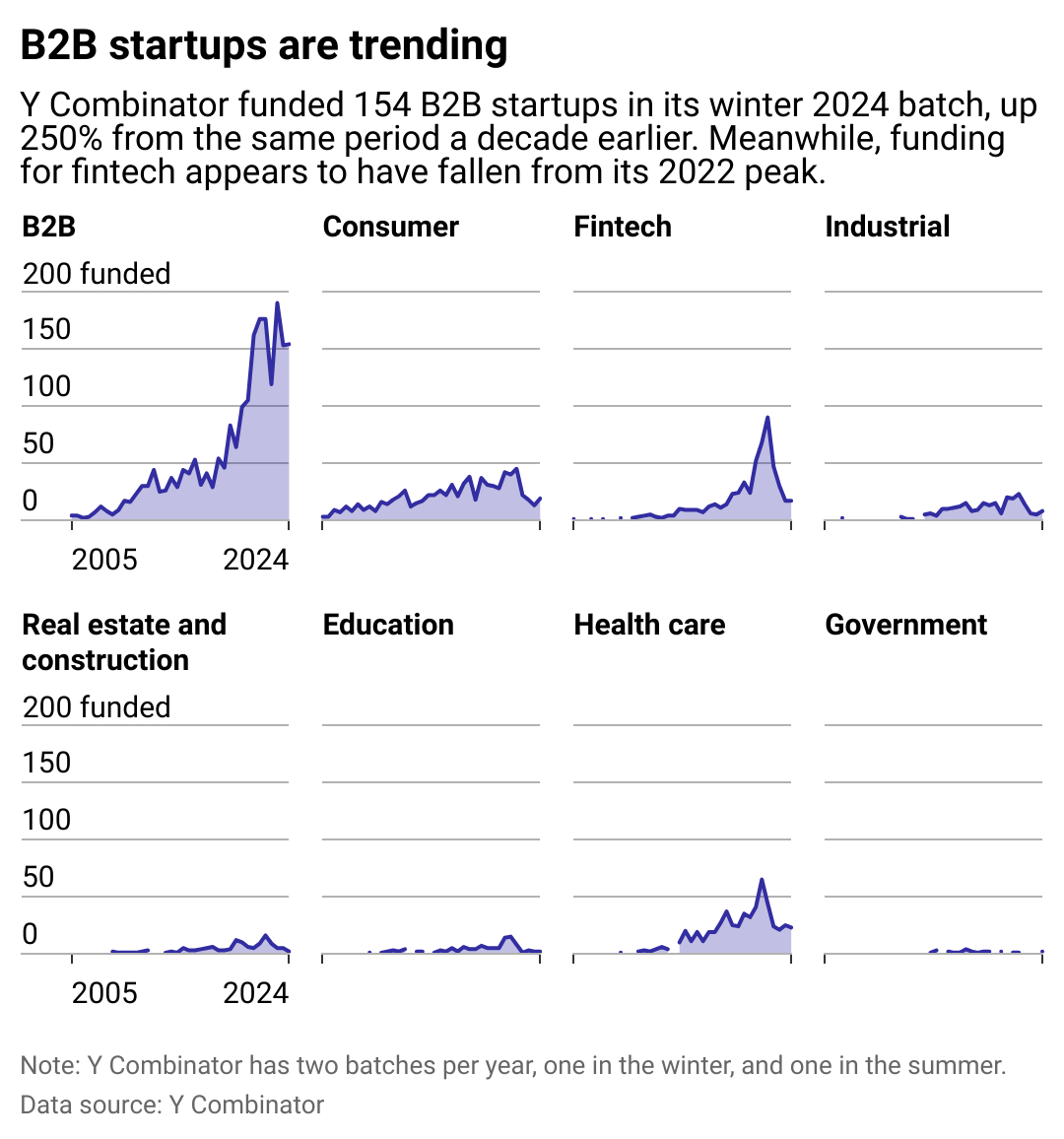
What trends are showing about the types of startups getting funding
This story originally appeared on Flippa and was produced and distributed in partnership with Stacker Studio.
What trends are showing about the types of startups getting funding
What kinds of startups are trending?
When inflation surged toward the end of the COVID-19 pandemic, central banks responded by raising interest rates, which caused companies to slash their investments. Reduced funding has hit the startup scene hard: Crunchbase data shows that venture capitalists invested just $285 billion in 2023, down from its $643 billion peak in 2021.
Despite this slowdown in investment activity, America's economy remains strong. National output, as measured by gross domestic product, grew by about 2.5% in 2023 after accounting for inflation, while unemployment sat at just around 3.9% in February 2024. These strong economic numbers, combined with recent advancements in artificial intelligence, have left many investors optimistic about the future.
To understand what kinds of startups are receiving funding, Flippa used data from Y Combinator, a prominent startup accelerator based in San Francisco, which launched in 2005. The firm invests in early-stage companies to provide mentorship and networking opportunities. Y Combinator's portfolio is heavily focused on technology; therefore, it might not perfectly represent the overall economy. Still, as the largest startup accelerator, its investments provide some sense of where things are headed.

AI startups are trending
Y Combinator has two "batches" per year: one held in the winter (roughly between January and March) and one in the summer (usually between July and September). One obvious trend has been the rise of startups working on AI. ChatGPT's launch in November 2022 was exciting to investors and entrepreneurs, not because it was a new product but rather because it heralded a new wave of innovation in AI.
Data from its past few batches confirms the popularity of AI. By our count, around 64% of startups backed by Y Combinator in its winter 2024 batch contained the phrase "artificial intelligence" or "AI" in their company descriptions, up from 49% in summer 2022, just before ChatGPT launched.
Startups are working to incorporate AI into a wide range of domains, many focused on office work productivity. One company is building tools to help people scan through legal documents; another is assisting employees in managing investor relations. One startup, Avail, even hopes to use AI to turn movie scripts into videos.

Business-to-business companies are especially popular
Y Combinator also provides data on which sectors their companies are working in. By far, the most common startups currently receiving funding from the accelerator are business-to-business companies. In the latest batch of winter 2024, 158 out of 235 (67%) Y Combinator-backed startups were focused on B2B—a steep increase from the winter 2022 batch, when only around half of the companies were oriented toward B2B. This change coincides with the rise of AI: Many founders are betting that, in the short term, there will be more opportunities for companies to take advantage of AI than individual consumers.
Fintech has seen an especially big decline in recent years. The decline is partly a result of investors and entrepreneurs shifting their focus to AI, but another part is the bursting of the cryptocurrency bubble in 2022. The price of bitcoin has recently soared again, hitting an all-time high of exceeding $73,000 on March 12, 2024, but consumer interest, as indicated by Google search data, remains below where it was in 2022.
The pace of technological advancement has been so accelerated over the past two years that it can be difficult to remember the current wave of AI development is still in its infancy. Many cutting-edge technology companies still do not have clear visions of where their products are ultimately headed. Moreover, it will take years, if not decades, for more traditional companies to implement these new advancements. This suggests startups working to deploy AI today will have plenty of problems to solve.
Story editing by Shannon Luders-Manuel. Copy editing by Paris Close.



